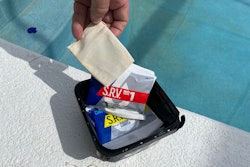A good number of entrepreneurs in this industry have accomplished what they set out to do - build a successful retail business.
They began with a dream - sometimes with little else - and grew their stores into healthy, profitable enterprises. With that dream fulfilled, and often with their golden years before them, they find themselves considering retirement, at least from the pool and spa industry.
These stores are small dynasties in the markets they serve, and they face the eternal problem of dynastic succession.
Throughout history, the easiest solution has been a direct heir, a child who shares the family name and has some understanding of the nature of the business and also what it represents to the people who built it. Failing that, some other person of obvious ability within the organization is sometimes identified and groomed for the role.
But not all dynasties are blessed with such a child or heir apparent. In these cases, the only option is to sell on the open market, which poses a host of much tougher problems. Among them: How does one transfer the guts of an organization to a novice? With the operation's continued success hinging on said transfer, how can one negotiate, in advance, a fair price?
The Exit Problem
It's a problem that faces a good many retailers both in and out of the pool and spa industry, says Fred Butler, co-founder of Pools Plus, Elizabethtown, Ky. Butler and his wife, Linda, launched the business in 1981, and over the years expanded to a second location. Pools Plus now encompasses sales of almost everything a homeowner might desire in a backyard, from loungers to spas to beautiful in-ground swimming pools.
Butler himself is pondering the challenge of transition, when the time comes, and is considering the option of franchising. This approach uses a two-step process: First, the store converts to a franchise. Then the franchise is sold to a buyer using the franchisor's sales apparatus. And finally, the franchisor educates the new owner on the ins and outs of the pool and spa business.
There are several factors that make this idea attractive, Butler says. The first has to do with money. Businesses such as Pools Plus are difficult to appraise accurately, and tricky to sell.
"Anyone who owns a small service business that they've spent a lot of their life building," he says, "will normally think that the actual market value of the business is a lot higher than it really is.
"The reason is that they have valuable experience. When customers walk in, they can problem solve, they can up sell, they can point out the benefits and features of products, whereas someone just coming into the business has to learn those things."
In short, it's the owner's experience that is the main value in the business, it's guarantor of success in the future, and that experience is walking out the door.
"And so if you have someone who is looking to exit the business," he says, "and they're looking to sell it to someone, particularly someone just off the street, they're going to have to stay with that business long enough to educate the buyer to a level where they can be successful."
That proposition is more difficult than it sounds. First, most owners have very little inclination to stick around after the sale. And secondly, the actual process of running a business in transition under two quasi-owners is, to put it delicately, quite delicate.
One need only imagine for a moment the feelings and perspectives of the two parties to see the opportunity for conflict. As Butler puts it, "I think that when you spend a long time in the business, and then someone comes in - even if they've worked for a couple of years in the business - the transfer of information to run the business can be overwhelming."
All of this serves to depress the sale price of the business, as the buyer may not be certain the seller will remain committed to the transition until the buyer is completely ready. Indeed, the seller may become frustrated or lose enthusiasm over the lengthy process of transition. It's a major risk factor, and when buying a business, added risk drives the purchase price down.
Franchising as an exit strategy eliminates the problem because the new owner gets that education and support from the franchisor, not the previous owner. And the franchisor has the expertise in transitioning, whereas the ordinary dealer who just wants to retire may not.
As Butler puts it succinctly, "It removes some of the doubt."
Inventory: Long Poles To Rubber Ducks
It was with this problem in mind that BioGuard began discussions of launching a pool and spa franchise nearly a decade ago, according to Scott Sutton, director of franchise operations for wknd., BioGuard's new franchise operation based in Lawrenceville, Ga.
"Several dealers came to BioGuard to try to come up with ways to make dealerships more transferable - to find exit strategies for retiring dealers," he says, "because a franchise gives these people a much better transition option."
From that seed grew the initiative to build wknd., a pool and spa franchisor that opened its concept store last year in Suwanee, Ga. This concept store is a fully operational pool and spa retail outfit that will serve as a model for new franchises.
These are intended to include both conversions and startups; although wknd. had its genesis as an exit strategy for existing dealers, it hopes to break ground on completely new stores, as well.
To aspiring retailers with sufficient capital, wknd. offers a turnkey full-service pool and spa store, complete with everything from long poles to rubber ducks; it's all laid out.
The franchisor consulted with successful dealers over the span of several years to develop materials and marketing and operational strategies to compete in the pool and spa and backyard market. While retaining some flexibility for individual circumstance, the plan is quite detailed. Two examples of the scope of the franchise are the Wellness Marketing Kit, which includes presentations and the follow-up materials to help retailers sell spas to doctors in the area, and the technology package for service vans.
This optional component includes a Motorola laptop with a water testing module attached to it. A handheld touchpad also accompanies this package, which the service tech can take into the backyard to quickly capture data on the condition of the deck, the water temperature, pH, sanitizer, etc. This information is included in a report to the homeowner, which is not left on a door hanger, but automatically e-mailed.
"What we're trying to do is add technology to make those operators more efficient," says Sutton, "and give them the edge that appeals to consumers, such as an integrated computer system for information and ordering. Eventually we'd like to have a service model like the one at Sears, where you order service, arrange a time and pay for it all online. Everything from the look of the store to its operation is designed for consumer appeal."
Full Speed Ahead
It has to be admitted that BioGuard's initiative is a bold one in an industry that has seen little franchising, especially in a down economy. To this contention, Sutton says simply, "We think it's a good enough idea to go ahead despite the economy."
To flourish, the idea has to work for everyone involved. The move makes sense for BioGuard because in addition to franchisor revenues, it has the potential to add distribution points for its products. It has to help dealers interested in converting stores in order to leave the business, and it has to help ease the entry of new entrepreneurs into the industry.
BioGuard is looking for those potential retailers in the ranks of the newly unemployed, the hundreds of thousands of bright, successful workers recently laid off from their jobs in corporate America.
"Our research shows," Sutton says, "that for franchising, when the economy slows down and people are being laid off, that's usually a good time for franchising. People who are coming out of corporate America, being let go from their jobs, are the kind of people who want to control their own destiny.
"And as you see money coming off of Wall Street, you'll see that money looking for other investment opportunities, such as franchising, or equity firms that support franchising."
As for the specific individuals, Sutton is looking for four things:
1) Motive. Why is a crucial question, he says. "If the answer is just 'I want to make a bunch of money,' then we are looking to dig a little bit deeper, because we want to make sure people are going to be happy as wknd. retailers. If they're not happy, they probably won't be successful."
2) Acceptance. Rogues make poor franchisees. A successful franchise owner has to be the kind of person who can accept the format and follow the process.
3) Management experience. Pool and spa store experience isn't essential, but management experience in general, especially combined with marketing and advertising experience, is a big plus.
4) Money. A franchise is a purchase. You either have the cash or you don't.
Pieces Together
Conceptually, the over-arching idea of wknd. is to create a single store that handles everything the homeowner sees through the patio slider. The products and structures are purchased, installed and serviced by a single entity.
Some dealerships do just that, but in other places, these different functions are offered piecemeal. The franchisor wants to integrate the various elements of the pool and spa industry - construction, retail and service - into a seamless package with a strong brand, focusing on the consumer experience.
"Our research tells us that generally, the people that are buying pools and spas fit into a certain bracket in terms of age and income and expectations.
"And so when you look at wknd.'s color scheme, the branding, the way it's laid out, the appointments within the store, they all reflect that research to provide customers with a superior experience inside the store."
In particular, the franchisor sees the service industry as an opportunity, and splits out a pool and spa maintenance franchise from the all-encompassing backyard enterprise for those who just want to focus on that business.
Sutton believes wknd.'s organized, technology-driven approach is just what that industry segment needs. "When you look at the people out there servicing pools, they're very good - at servicing pools. Many of them are not as good at marketing, advertising, bookkeeping, technology . . . and that's what we're looking to provide that operator. We want to free them to do what they do best by easing the burden of business operations on the other side. If you can marry those two together, you can be very successful."
The franchisor hopes to sign its first conversion contract this spring.
"In terms of leads, the response so far has been even better than we expected," Sutton says. "It's an opportunity to offer an upscale, unified and branded concept. This will be the only franchise of its kind in an industry where franchising is not the norm."








































